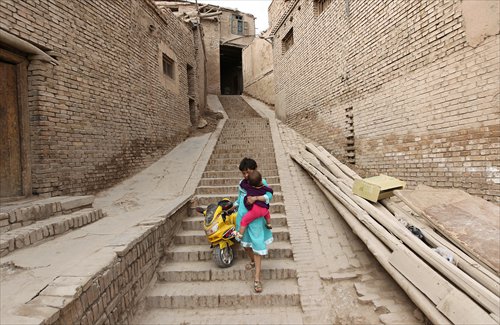 Amphibious armored vehicle unit conducts open sea drill
Amphibious armored vehicle unit conducts open sea drill
 Water relay in Henan
Water relay in Henan
 Ethnic culture feasts eyes of travelers
Ethnic culture feasts eyes of travelers
 80 security dogs assembled in Nanjing police dog training base
80 security dogs assembled in Nanjing police dog training base
 Graffiti artists paint on street walls in Xinjiang
Graffiti artists paint on street walls in Xinjiang
 Story of ceramic artist Zhang Lingyun
Story of ceramic artist Zhang Lingyun
 Magic summer night dream in Hongyuan
Magic summer night dream in Hongyuan
 Incredible creatures in headwaters drainage region of Lancang River
Incredible creatures in headwaters drainage region of Lancang River
 The future of rock n' roll seen in young rockers in China
The future of rock n' roll seen in young rockers in China
 Magnificent Yanziya Cliff
Magnificent Yanziya Cliff

Uyghur children descend from a slope of stairs in the Gaotai residential area in central Kashgar, Xinjiang Uyghur Autonomous Region. (Photo/Global Times)
Zola Guri, 39, has been living in a 20-square-meter mud house since she was born. She inherited the 150-year-old house from her ancestors and vowed to preserve this historical treasure and pass it down to her offspring.
But now, Guri wants change.
"The house needs a complete renovation, from inside to outside," Guri, a Uyghur mother of three, told the Global Times, in her 10-square-meter living room which is half-occupied by a large sleeping platform.
"It's too crowded for me, my husband, and three children to live in. The living conditions are awful. What's more, the house is dilapidated and it is dangerous for us to live inside it."
Guri's home is one of the 447 households in Gaotai residential area, which, with 600 years of history, still maintains the traditional lifestyle of the local residents. However, the fragile structures are now in urgent need of reinforcement.
A majority of the households in the area have the same problems as Guri does.
Built on a loess plateau in the southeast section of the old town in Kashgar, houses in the Gaotai residential area are old and dilapidated. They want their centuries-old houses to be renovated, but lack the money and capability to improve their living conditions.
People like Guri hope an ongoing renovation project in the old town, aimed at preserving the cultural relics while enhancing their ability to resist earthquakes, will benefit them.
Local authorities have made great efforts to renovate and enhance their earthquake resistance capability since 2009. The renovation work, encompassing 28 dilapidated districts, 65,000 households and 5.07 million square meters, aims to be completed by 2017, statistics from local authorities showed.
However, as the renovations progressed to fixing other outlying parts of the old town, the renovation work of Gaotai, the core center of the old city, never really started.
Local authorities have placed some basic frame "skeletons" to support the weight of dilapidated outer walls on several houses there, but aside from that there has been no significant renovation. Some families have left the area and moved to other places due to the bad living conditions and safety hazards.
"We have to deal with it cautiously. There are critics who say that we might destroy or cause damage to the relic houses if the work cannot be done properly," He Tao, a member of the standing committee of the Communist Party of China's Kashgar committee, who is in charge of the renovation of the old town, told the Global Times.
"In this way, we have to be thoughtful about the protection and renovation plan before we start to work."
 |
 Beautiful policewoman in an anti-terrorism SWAT team
Beautiful policewoman in an anti-terrorism SWAT team Cute photos of little Taoist nuns and monks go viral online
Cute photos of little Taoist nuns and monks go viral online Amphibious armored vehicle unit conducts open sea drill
Amphibious armored vehicle unit conducts open sea drill A post-90s girl who takes grandma to work
A post-90s girl who takes grandma to work Beijing policewomen posters become a hit
Beijing policewomen posters become a hit Armored regiment trains on the sea
Armored regiment trains on the sea Children spend 'Father's Day' with dads at work
Children spend 'Father's Day' with dads at work 'Pan Da' appear in Shanghai World Financial Center
'Pan Da' appear in Shanghai World Financial Center Champions take selfies on podium
Champions take selfies on podium The vanishing folk skills
The vanishing folk skills Intoxicating beauty of Dali, Yunnan province
Intoxicating beauty of Dali, Yunnan province Memorable moments of Ludian earthquake
Memorable moments of Ludian earthquake Bring world together to help elephant
Bring world together to help elephant 'Building Dreams'
'Building Dreams'  Labrang Monastery
Labrang MonasteryDay|Week|Month